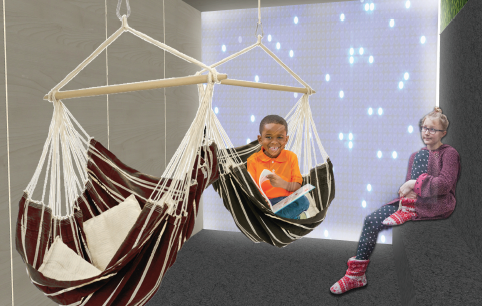Context
The Centre intégré universitaire de santé et de services sociaux de la Mauricie-et-du-Centre-du-Québec (CIUSSS MCQ) contacted Professor Virginie LaSalle to help with the interior design of a new model of transitional housing for young people aged 8 to 14 with a complex multi-problematic profile.
These transitional housing spaces must be designed to meet the specific needs of the targeted clientele as well as the clinical practitioners working there. It is essential that the facilities be safe, durable and adapted to the activities taking place in the various spaces. In addition, it is expected that the atmosphere of these places will be different from an “institutional” atmosphere; in this sense, we wish to create a welcoming and soothing atmosphere, adapted to the sensory characteristics of the young people who stay there.
The primary objective of the preferred approach is to ensure the quality of the living spaces whose plans were initially developed by a commissioned architect, and to propose ways of improving these facilities in support of the clinical environment. With this intention, the work is carried out in relation to that of the interior designer Julien Delannoy, mandated for this project by the CIUSSS MCQ. The steps taken must eventually be integrated into a “Design Guide” produced in order to provide recommendations and findings that will inform comparable projects.
Implemented approach
The approach implemented includes (1) the production of a report with general recommendations on the interior design of the transitional housing model for youth with a complex multi-problematic profile, developed for the ICSSS MCQ. This document will focus on design principles to be respected and best design practices, in support of the ICSUSS and design team’s decisions. The codesign workshop (2) held in Trois-Rivières with clinical stakeholders, residents’ families and ICSUSS officials (October 2019) provided an opportunity to test the preliminary design proposals against the experiential knowledge and expertise of the various future users of the site. Finally, coordination was ensured between the consulting team and the design team to ensure the transfer of knowledge and the smooth functioning of the design process.
Virginie Lasalle, Anne Cormier and Denis Bilodeau
research funded by the Integrated University Center of Health and Social Services of the Mauricie-et-du-Centre-du-Québec

